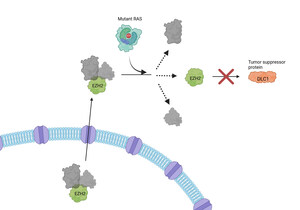Lung Cancer And African Americans: Know The Facts
By the National Cancer Institute
Editor's Note: The following article is part of the monthly Lifelines education and awareness print series that the National Cancer Institute provides to African American news and information outlets.
BETHESDA, Md., Nov. 29, 2012 /PRNewswire-USNewswire/ -- First, the bad news. Lung cancer kills more African Americans than any other type of cancer. And African Americans have higher rates of lung cancer than white Americans: for example, from 2003 to 2007, African American men had a 23 percent higher rate of new lung cancer diagnoses than white men. African Americans also have a lower five-year relative survival rate than whites. Furthermore, some studies have shown that African Americans with early-stage disease are less likely than whites to receive surgery, which offers the best chance for a cure.
(Logo: http://photos.prnewswire.com/prnh/20111018/DC89117LOGO)
Fortunately, there is also some good news: because of changes in smoking patterns, the rate of lung cancer has been declining among African American men since the mid-1980s and has been stable among African American women since 1990. The differences in lung cancer death rates between African Americans and whites are narrowing. And, most important, the vast majority of cases of lung cancer can be prevented. November is Lung Cancer Awareness Month, a good time to separate myth from fact when it comes to lung cancer.
So what are the facts?
- Smoking is the primary cause of lung cancer. Not smoking is the best way to prevent lung cancer. Quitting smoking greatly lowers the risk of cancer and other diseases.
About 90 percent of lung cancer cases in men and about 80 percent of those in women are caused by smoking. Smoking also causes many other cancers, including esophagus, throat, pancreatic, kidney, and bladder cancer, as well as heart disease, stroke, aortic aneurysm, chronic obstructive pulmonary disease, and other health problems. Overall, smoking causes almost half a million premature deaths every year in the United States.
- Free resources are available to help you quit smoking.
The National Cancer Institute's Smoking Quitline lets you talk for free with a smoking cessation counselor. You can call 1-877-44U-QUIT (1-877-448-7848) toll free within the United States, Monday through Friday 8:00 a.m. to 8:00 p.m. Eastern Time.
1-800-QUIT-NOW, another free quitline, can provide smoking cessation counseling, a personalized quit plan and self-help materials, and the latest information about medications to help you quit.
On the Internet, NCI's LiveHelp Online Chat (https://livehelp.cancer.gov/) allows you to get information and advice about quitting smoking through a confidential online text chat with an information specialist from the NCI's Cancer Information Service, Monday through Friday, 8:00 a.m. to 11:00 p.m. Eastern Time.
Smokefree.gov, Women.Smokefree.gov, and Teen.Smokefree.gov provide additional tools on the Internet—as well as several mobile apps—to help you quit.
SmokefreeTXT (http://smokefree.gov/smokefreetxt) is a free text-messaging program that provides 24/7 encouragement, advice, and tips to help smokers stop smoking for good. The text program, which is available in English and Spanish, starts 2 weeks before your quit date and lasts for 6 weeks following your quit date.. Normal carrier rates apply if you do not have unlimited text messaging.
Your healthcare provider can also provide support, resources, and medications to help you quit smoking.
- Screening with computed tomography (CT) can help reduce lung cancer deaths in heavy smokers.
In a recent clinical trial, called the National Lung Screening Trial (NLST), current and former heavy smokers were screened with low-dose helical computed tomography (CT) or chest X-rays. Those who were screened with low-dose CT were 20 percent less likely to die from lung cancer than those who were screened with chest X-rays. (Previous studies had shown that screening with chest X-rays does not reduce deaths from lung cancer.)
If you have smoked an average of a pack of cigarettes a day for 30 years and still smoke or stopped less than 15 years ago, you may want to talk with your healthcare provider about whether you should undergo lung cancer screening. Because the procedure is relatively new, it may not be covered by many health insurance policies. Also, as with any screening test, there are possible harms as well as benefits, including false alarms that lead to invasive tests or operations that could cause complications.
No other screening tests have been shown to reduce the risk of dying from lung cancer.
To learn more about lung cancer, visit the National Cancer Institute (NCI) Web site at www.cancer.gov (search term: lung) or call 1-800-4-CANCER (1-800-422-6237). NCI has a variety of information on lung cancer risk, prevention, screening, treatment, clinical trials, and a host of other topics.
NCI leads the National Cancer Program and the NIH effort to dramatically reduce the burden of cancer and improve the lives of cancer patients and their families, through research into prevention and cancer biology, the development of new interventions, and the training and mentoring of new researchers. For more information about cancer, please visit the NCI web site at www.cancer.gov or call NCI's Cancer Information Service at 1-800-4-CANCER (1-800-422-6237). More articles and videos in the culturally relevant Lifelines series are available at www.cancer.gov/lifelines.
SOURCE National Cancer Institute
WANT YOUR COMPANY'S NEWS FEATURED ON PRNEWSWIRE.COM?
Newsrooms &
Influencers
Digital Media
Outlets
Journalists
Opted In




Share this article